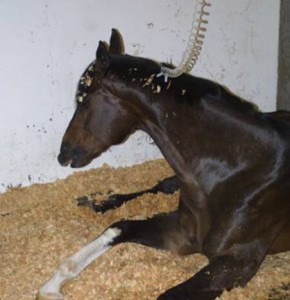New Study Helps Identify Colic Risk After Anesthesia
A new US colic study, published in Equine Veterinary Journal (EVJ), in partnership with the American Association of Equine Practitioners, has identified various risk factors, including delayed fecal output and increasing blood lactate, associated with post-anesthetic colic. This new information should enable vets to implement preventative measures to help reduce incidences of colic in the future.
Gastrointestinal pain, generally referred to as colic, has been estimated to occur in 2.8–6% of horses following general anesthesia for elective procedures, the most common cause being impaction of the large intestine or caecum. The study Risk factors associated with gastrointestinal dysfunction in horses undergoing elective procedures under general anesthesia1 was conducted by surgeons based at the College of Veterinary Medicine and Biomedical Sciences at Colorado State University, USA.
The medical records of 416 horses undergoing general anesthesia were collected over a two-year period and the potential risk factors were examined. 8.7% of horses were diagnosed with gastrointestinal dysfunction – higher than previous estimates probably because the study included horses requiring treatment for decreased fecal output whereas previous studies did not. Potential risk factors were assessed, including fecal output, which was decreased in 38.9% of cases, blood lactate, position during surgery, rectal temperature and breed of horse.
The results showed that Arabian horses, increasing blood lactate, right lateral recumbency, decreased rectal temperature post-procedure and delayed passage of feces were significantly associated with an increased risk of gastrointestinal dysfunction.
“These findings should help the clinician identify higher risk horses and be proactive about their management in the post-anesthetic period,” said Diana Hassel, who instigated the study. “This may include pre-emptive nasogastric intubation and administration of mineral oil and/or water and electrolytes. Although core temperature control in horses is difficult to achieve in adult horses during surgery, further research into this field may prove beneficial.”
Professor Celia Marr, Editor of the Equine Veterinary Journal continued: “This study brings obvious and immediate practical benefits for clinicians and the horses under their care. Rigorous monitoring of higher risk surgical cases should lead to a reduction in incidences of post-operative colic, making recovery procedures less difficult and outcomes more favorable.”
1Risk factors associated with gastrointestinal dysfunction in horses undergoing elective procedures under general anesthesia B. B. NELSON, E. E. LORDAN and D. M. HASSEL, Department of Clinical Sciences, College of Veterinary Medicine and Biomedical Sciences, Colorado State University, USA.











